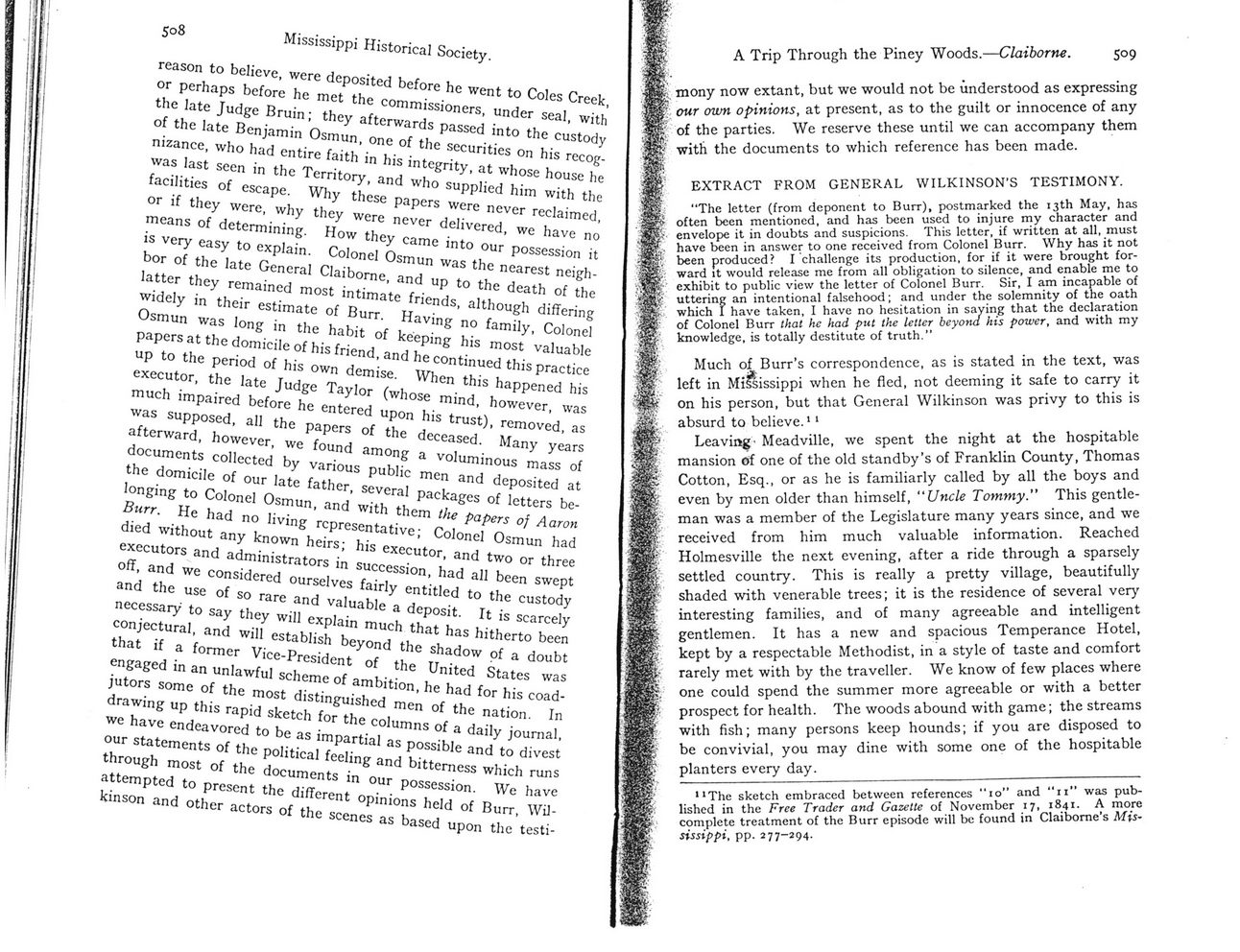This text was obtained via automated optical character recognition.
It has not been edited and may therefore contain several errors.
Mississippi Historical S?cie,y. reason to believe, were deposited before he went to Coles Creek, or perhaps before he met the commissioners, under seal, with the late Judge Bruin; they afterwards passed into the custody of the late Benjamin Osmun, one of the securities on his recognizance, who had entire faith in his integrity, at whose house he was last seen in the Territory, and who supplied him with the facilities of escape. Why these papers were never reclaimed, or if they were, why they were never delivered, we have no means of determining. How they came into our possession it is very easy to explain. Colonel Osmun was the nearest neighbor of the late General Claiborne, and up to the death of the latter they remained most intimate friends, although differing widely in their estimate of Burr. Having no family, Colonel Osmun was long in the habit of keeping his most valuable papers at the domicile of his friend, and he continued this practice up to the period of his own demise. When this happened his executor, the late Judge Taylor (whose mind, however, was much impaired before he entered upon his trust), removed, as was supposed, all the papers of the deceased. Many years afterward, however, we found among a voluminous mass of documents collected by various public men and deposited at the domicile of our late father, several packages of letters belonging to Colonel Osmun, and with them the papers of Aaron Burr. He had no living representative; Colonel Osmun had died without any known heirs; his executor, and two or three executors and administrators in succession, had all been swept off, and we considered ourselves fairly entitled to the custody and the use of so rare and valuable a deposit. It is scarcely necessary to say they will explain much that has hitherto been conjectural, and will establish beyond the shadow of a doubt that if a former Vice-President of the United States was engaged in an unlawful scheme of ambition, he had for his coadjutors some of the most distinguished men of the nation. In drawing up this rapid sketch for the columns of a daily journal, we have endeavored to be as impartial as possible and to divest our statements of the political feeling and bitterness which runs through most of the documents in our possession. We have attempted to present the different opinions held of Burr, Wilkinson and other actors of the scenes as based upon the testi- A Trip Through the Piney Woods.?Claiborne. 509 mony now extant, but we would not be understood as expressing our own opinions, at present, as to the guilt or innocence of any of the parties. We reserve these until we can accompany them with the documents to which reference has been made. EXTRACT FROM GENERAL WILKINSON?S TESTIMONY. ?The letter (from deponent to Burr), postmarked the 13th May, has often been mentioned, and has been used to injure my character and envelope it in doubts and suspicions. This letter, if written at all, must have been in answer to one received from Colonel Burr. Why has it not been produced? I challenge its production, for if it were brought forward it would release me from all obligation to silence, and enable me to exhibit to public view the letter of Colonel Burr. Sir, I am incapable of uttering an intentional falsehood; and under the solemnity of the oath which I have taken, I have no hesitation in saying that the declaration of Colonel Burr that he had put the letter beyond his power, and with my knowledge, is totally destitute of truth." Much of Burr?s correspondence, as is stated in the text, was left in Mississippi when he fled, not deeming it safe to carry it on his person, but that General Wilkinson was privy to this is absurd to believe.11 Leaving' Meadville, we spent the night at the hospitable mansion of one of the old standby?s of Franklin County, Thomas Cotton, Esq., or as he is familiarly called by all the boys and even by men older than himself, ?Uncle Tommy.? This gentleman was a member of the Legislature many years since, and we received from him much valuable information. Reached Holmesville the next evening, after a ride through a sparsely settled country. This is really a pretty village, beautifully shaded with venerable trees; it is the residence of several very interesting families, and of many agreeable and intelligent gentlemen. It has a new and spacious Temperance Hotel, kept by a respectable Methodist, in a style of taste and comfort rarely met with by the traveller. We know of few places where one could spend the summer more agreeable or with a better prospect for health. The woods abound with game; the streams with fish; many persons keep hounds; if you are disposed to be convivial, you may dine with some one of the hospitable planters every day. ?The sketch embraced between references ?10? and ?n? was published in the Free Trader and Gazette of November 17, 1841. A more complete treatment of the Burr episode will be found in Claiborne?s Mississippi, pp. 277-294.

Claiborne, J.F.H Claiborne-J.F.H-022